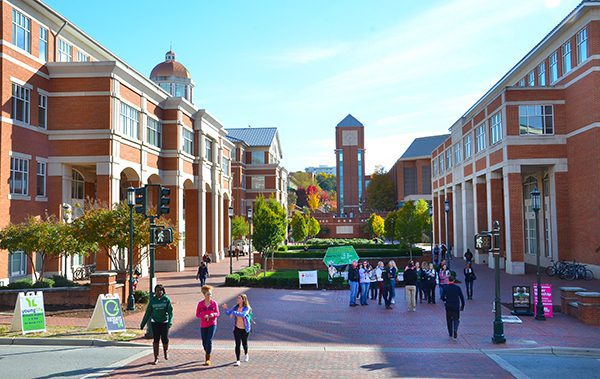NSF Funds Research for AI Systems to Improve Public Safety

Researchers at UNC Charlotte have been awarded funding from the National Science Foundation (NSF)’s Smart and Connected Communities program to co-develop technology to support public safety. The $1.9 million, four-year grant will develop an optical sensing platform that uses artificial intelligence to detect and prevent street crime without the use of profiling. The technology will be developed with the cooperation of the Charlotte communities in which it will be deployed, a participatory strategy that will improve safety while respecting the needs of neighborhoods, and improve the likelihood of widespread adoption.
The project, “Building Safe and Secure Communities through Real-Time Edge Video Analytics,” is led by UNC Charlotte Assistant Professor of Electrical and Computer Engineering Hamed Tabkhi. Co-principal investigators are Shannon Reid from the Department of Criminal Justice and Criminology; Arun Ravindran from the Department of Electrical and Computer Engineering; Srinivas Pulugurtha from the IDEAS Center and the Department of Civil and Environmental Engineering; and Douglas Shoemaker from the Center for Applied Geographic Information Science.
The NSF has long been a leader in supporting fundamental research to equip U.S. cities and communities with more responsive and adaptive technologies and services. Smart and connected communities successfully integrate people with information and communication technologies to improve economic opportunity and growth, safety and security, health and wellness, and overall quality of life.
“The Smart and Connected Communities program continues to generate innovative and collaborative research applications that are addressing challenges faced by our local communities and cities and are offering solutions to help improve people’s lives,” said Jim Kurose, assistant director for NSF’s Computer and Information Science and Engineering. “As part of our broader portfolio of investments in local communities, the NSF-WINS challenge has tapped into the creativity of teams across the country who do not typically apply to NSF to come up with solutions to the pressing challenges of digital connectivity.”
In 2017, the UNC Charlotte group began their research with an NSF planning grant that allowed them to engage with community leaders in Charlotte’s North End Smart District and ask them what types of security concerns they had, and what were the special requirement of their neighborhoods. Using surveys, they found broad support for technology leading to safer streets, with valuable feedback regarding how best to go about it.
“So often the community is not actively engaged in the topics that immediately involve them. We thought we could do it better, and actually learned from residents how best our technology could support them,” said Tabkhi. “From their responses we realized that by working closely with residents, we could make our platform better and improve public safety and build trust at the same time.”
Smart Cities is a movement where technology and analysis of “big data” are leveraged to make cities more efficient and responsive. Smart technologies can be complex as 5G wireless networks and self-driving cars, and as simple as walkable neighborhoods. However, crime and the perception of risk can be obstacles to the deployment and adoption of digital solutions. Tabkhi and his team hope to enable smart city applications to be more effective by placing residents “in the loop” of information, and warning them of public safety risks through automated monitoring and reporting.
The researchers describe the project both as the development of a key technology and as an extended experiment testing how that technology can and should be used by local communities — in cooperation and consultation with those communities.
As the grant proposal describes: “The proposed research makes fundamental advances in multiple areas from computer vision, computer architecture, and real-time edge computing, as well as criminology and community-technology interaction. It paves a path for bringing the recent advances in deep learning and data analytics to enhance the safety and security of communities without jeopardizing the privacy of residents.”
“Our AI platform can make residents aware of safety issues, such as street crime, without the use of identities or profiling,” said Tabkhi. “Instead we focus on detecting behaviors associated with crime, something we call ‘intelligent’ policing.”
The group intends to take what they are learning from residents and use that to begin training intelligent policing algorithms in an on-campus testbed before deploying limited, experimental engagements at invited locations in Charlotte, Concord and Gastonia.
The project has numerous community partners, including the city of Charlotte, and continues to recruit others. Community presentations on the project were held last spring as part of the planning grant, and the researchers intend to hold numerous others in the future.
Media Contact: James Hathaway, 704-687-5743
jbhathaw@uncc.edu